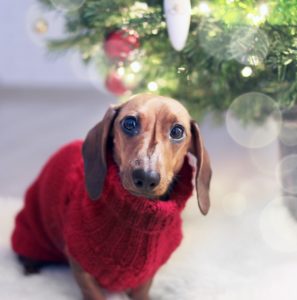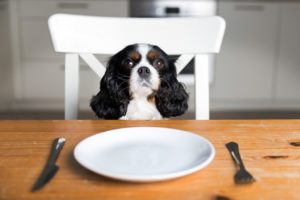3:28 pm

The hustle and bustle of the holiday season is in full swing, and we bet you are as busy as we are. AERA’s emergency department stays busy during the holidays with pets who get into dangerous foods, decorations, and other holiday mischief. Our emergency service is available 24/7 over the holidays, but we would rather your pet safely enjoy time with you and avoid an unplanned trip to the veterinarian. Between carolling and decking the halls, pause and ensure you are following these safety tips to prevent a holiday emergency.
With so many seasonal foods and treats around, your pet will probably beg you to slip them a bite. You may not realize, however, that many human holiday treats can be toxic to your pet, including:
If your pet eats any toxic food, call the Pet Poison Helpline at 800-213-6680 immediately. Fast action is critical, since some toxicities can be lethal, and successful decontamination depends on treatment within a few hours of ingestion.
Rich holiday foods, especially those with high fat or salt content, can make your pet dangerously sick. Any abrupt diet change may upset your pet’s digestive tract, but fatty turkey scraps or ham trimmings can cause the pancreas to release a surge of digestive enzymes that can trigger severe inflammation. Severe cases may cause vomiting, abdominal pain, dehydration, and life-threatening systemic effects.
Also, never give your pet meat bones, which may crumble or splinter and cause digestive upset, or intestinal obstruction, which is a more serious risk that may require emergency surgical removal.

Your Christmas tree may look like an intriguing jungle gym to your pet, who may try to climb it, knock ornaments off, or chew on electric cords. Practice tree-safety rules, such as:
Fresh plants add a festive touch to your holiday decor, but mistletoe, pine, holly, and lilies can be toxic to pets, and should not be put in homes with pets who may eat their leaves, flowers, or berries. Poinsettias can also be mildly toxic and should be kept out of reach of pets.
As guests arrive, remind them not to share food with your pet, and set out a treat jar so they can still spoil your furry friend. Also, ask guests to refrain from letting your pet out for potty breaks so they do not accidentally let them out the wrong door into an unfenced area where they could escape.
If you are hosting overnight guests, ask them to leave their room door closed so your pet cannot get into their belongings. According to the ASPCA, human medications are the most common toxins ingested by pets, so ask guests to keep all their prescription and over-the-counter medications where your pet cannot find them.
Loud noises are particularly scary for some pets, and noisemakers, fireworks, and other boisterous celebrations used to ring in the new year may cause severe anxiety. If your pet is afraid of loud noises, skip the rowdy party and spend a quiet night with a few close friends or family members who will help keep them calm.
Your neighbors may not be sensitive to your noise-phobic pet, and create a ruckus with fireworks or other loud noisemakers. Animal shelters house many pets who run away on New Year’s Eve to escape scary noises. Accompany your pet outside for potty breaks, and keep them on a leash or in your fenced yard at all times so they do not startle and suddenly bolt.
The happiest holiday is one you spend safely with all your family members—two-legged and four. If you have any questions, or think your pet needs emergency care, contact your family veterinarian or AERA immediately.